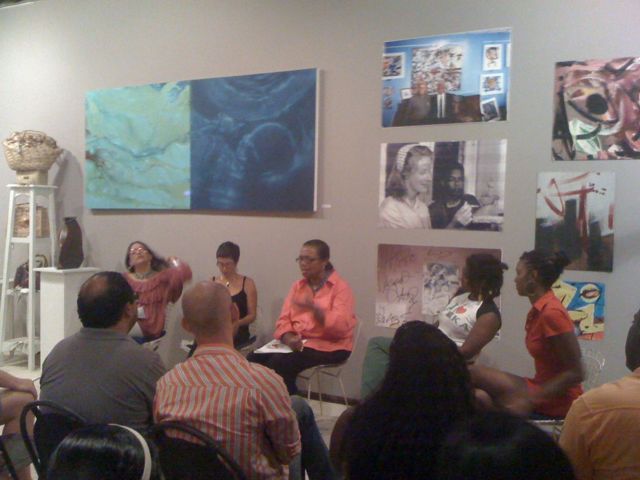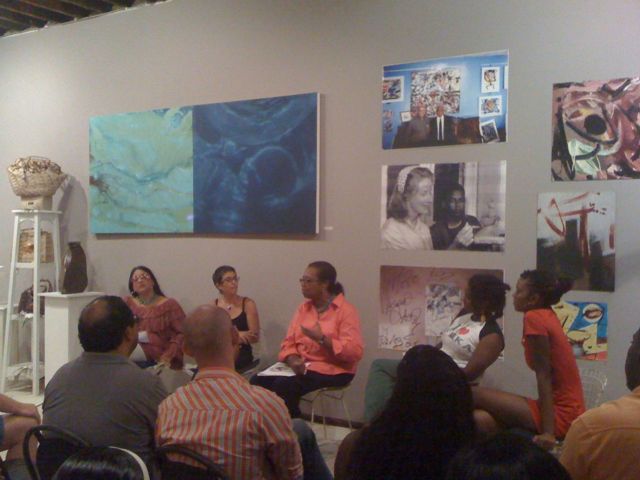We on the arts community in The Bahamas often like to believe that things are different for artists in other Caribbean nations. This blog post from PLEASURE blog suggests that it's not so:
Tomorrow, the spanking new $518 million National Academy for the Performing Arts around the Queen's Park Savannah, Port of Spain, will officially open. But a few blocks away, at the corner of Roberts and White Street, Woodbrook, the historic Little Carib Theatre will remain boarded-up and shut. The restoration of that historic theatre, which was founded by local dance legend Beryl McBurnie in 1947 and which has played a key role in the development of the arts in this country, has stalled for about two years.The problem? Reportedly a lack of funding, with an additional $2 million needed to complete the restoration not forthcoming from the State. The same State that can pump $2 million into a flag around the crumbling Hasley Crawford Stadium and which can build arts academies apparently at the snap of its fingers.
* P L E A S U R E *: A place for the arts
It sounds all too familiar -- white elephants being created by decision makers more interested in showing off, attracting foreign investment, or negotiating cool perks than in building a nation for real. Of course in Trinidad, where oil money confers delusions of splendour, the showing off is of the glitziest kind.
The context: the T&T government has built, with Chinese money, something it is calling its National Academy for the Performing Arts, which is fancy, and which can ensure that the T&T government can have something that can be plastered on glossy magazine pages as evidence that the Caribbean is not home to transplanted savages and native beachbabes clad in Lion of Judah hula skirts and floral arrangements. At the same time, though, as is common with us all in Caribbean societies, the things that have made central contributions to the development of the arts are left to languish, perhaps because they're not glitzy enough, or because they mean nothing to the philistines who far too ordinarily get themselves elected to positions of power, or because they represent too much competence, outspokenness or creativity for the individuals who have been given charge of the government departments responsible for implementing government's policies. In Trinidad, the Little Carib Theatre and the Trinidad Theatre Workshop share fates that are not very different from the Dundas Centre for the Performing Arts here in The Bahamas, which is being eaten from top to bottom by a very happy army of termites, or from any of the so-called "National" performing arts entities, not one of which has an adequate home:
Examine, for instance, the traumas of the Trinidad Theatre Workshop (TTW), once housed at the Old Fire Station Building on Abercromby Street, Port-of-Spain. The TTW, whose founder was Nobel Laureate Derek Walcott, was housed at that historic building for ten years from 1989 to 1994, when Walcott won the Nobel, and then to 1999.
Yet, after a swanky restoration, and the construction of a National Library around it, the TTW was quickly booted out of the building and left to find accommodation in a small gingerbread house on Jernigham Avenue in Belmont. To date, despite its name, the TTW has no real theatre of its own, with a small space at the house in Belmont acting as a performance area. The Old Fire Station is used for such things as press conferences by the Ministry of Information as well as hosting administrative offices.
There are times, indeed, when I'm thankful for the studied and deliberate contempt paid to Bahamian artists and arts in this country, thankful for the fact that the turn-of-the-century $3 million gift the Chinese government earmarked for our own Centre for the Performing Arts was not spent the way the Chinese wanted it to be spent (i.e. on renovating the NCPA on Shirley Street so that it could actually house performing arts, rather than function as it has been doing for the past 9 years now, as a glorified church hall). PLEASURE blog shows what might have happened:
The new academy was designed without any real consultation with the local artist community whatsoever, according to artists. The design was done by a Chinese firm, built by a Chinese contractor in accordance with Chinese building codes and specifications.
The building was supposedly inspired by the national flower, the Chaconia. But that is a loose association; the structure looks more like an imitation of the Sydney Opera House. Or a kind of sophisticated alien space-craft. How it fits into its environment also seems to have been an oversight by the designers, as the building looks away from the green of the Savannah and its environs, instead of paying tribute to them. This week, as preparations for tomorrow's opening continued with curious members of the public strolling around the academy, Chinese workers who will never be afforded the luxury of attending the swanky performances inside worked overtime to the sound of Chinese techno music playing from speakers housed in large wrought-iron boxes around the building's perimeter.
Questions have been raised about the adequacy of the steel used to build the structure, as well as the suitability of the design for performance. One Government minister has even pubically admitted, at the hearings of the Uff Commission of Inquiry, that some aspects of the building may be unsuitable to "performance" and more suitable to "training". And the myriad of concerns over top-level corruption looming over Udecott, the State company that handled the project, go without saying.
* P L E A S U R E *: A place for the arts
Despite all of this, in the face of it, the arts in Trinidad and Tobago are flourishing, thanks to individual action in the vacuum.
It is a crowning irony that throughout all of this, some have managed to find fertile places for art in the most unexpected of places. For instance, the million-dollar, shimmery structure that will open tomorrow may be an audacious sight, but it may never compare to what is happening at smaller spaces like Alice Yard, which is a few blocks away from the neglected Little Carib Theatre on Roberts Street.At Alice Yard, a simple backyard has, over the last three years, done more for contemporary arts and discourse in this country than any $518 million mega-project can hope to do. Could it be that the State's neglect has actually engineered the conditions for true artistic creativity?
* P L E A S U R E *: A place for the arts
The answer, apparently, lies in taking matters into one's own hands, in not waiting for the "government" to deliver what one needs. (Hail Rik and Idebu!) So here's to us, artists. Artists of the Caribbean, unite!






